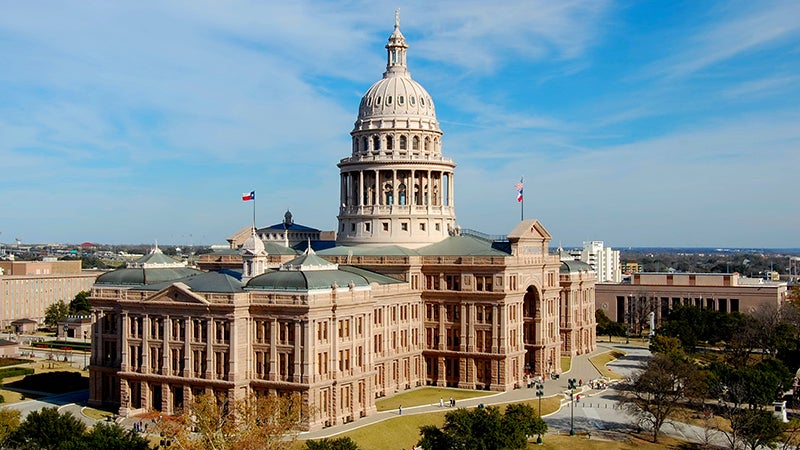Do you know the new Texas laws that came with the New Year?
Published 12:08 am Friday, January 3, 2020
The new year brings two-dozen new Texas laws and other important changes set in motion by the Legislature in 2019, including protections for surprise medical bills, greater transparency for government spending and criminal penalties for those who fail to report sexual violence on college campuses.
Also taking effect on the first day of 2020 are laws targeting online data breaches, “pill mill” pharmacies and obstacles that keep former prison inmates from getting a job.
Other new laws implement several of the amendments to the Texas Constitution that voters approved in November.
The latest round of new statutes adds to the list of almost 1,300 state laws that had already taken effect in 2019 — the legacy of the 86th session of the Texas Legislature, which ended in May.
For government watchdogs, one of the highlights of the session was Senate Bill 943, which requires state and local governments to disclose how much public money has been spent on outside contracts and information related to whether the terms of a contract had been met.
The law was in response to two Texas Supreme Court rulings in 2015 that allowed key information about government contracts to be withheld if vendors claimed its release would provide competitors with an unfair advantage.
Legislative records show that the broad exception was used to deny more than 2,600 public information requests in three years — including, most famously, how much money McAllen paid pop singer Enrique Iglesias to perform at a holiday concert (the city said disclosure would hurt its ability to negotiate future entertainment contracts).
Unsuccessful in passing a similar bill in the 2017 session, state Sen. Kirk Watson, D-Austin, said he tried again in 2019 to protect the public’s right to monitor government spending.
“It wasn’t easy and it required a multi-year, multi-session effort,” Watson said. “Thankfully, a large and bipartisan coalition of lawmakers, attorneys and advocates came together to repair the significant damage done to Texans knowing how their governments spend their money.”
Another law, SB 1264, seeks to limit surprise medical bills for some patients who, often unknowingly, seek care that is outside their health plan’s network of doctors and labs.
The problem frequently arises during emergency care, though surprisingly high bills have hit others who, for example, had surgery at an in-network hospital but also received care from an anesthesiologist or other provider who was not part of their health plan.
Under the law, doctors and health facilities can no longer send out-of-network bills directly to patients. Instead, they must resolve conflicts over money via arbitration or mediation with insurance companies, keeping patients out of the dispute.
SB 1264, however, has limited reach, applying to state-regulated insurance plans and those covered under the state employee or teacher retirement systems — about 16% of Texans, the state Department of Insurance estimates.
Although the law took effect in September, the new protections apply only to medical treatment received after Jan. 1, 2020.
Sexual violence
In response to disturbing reports on the prevalence of sexual violence on college campuses, SB 212 requires all university employees — not just faculty members — to report instances of sexual assault, harassment, dating violence and stalking that they witness or hear about.
The law has been in place since September, but the penalties kick in with the start of 2020, making it a Class B misdemeanor — which carries a maximum $2,000 fine and 180-day jail term — for those who fail to report incidents to the school’s Title IX coordinator.
Making a false report of sexual violence carries the same penalty.
The law also requires schools to fire employees who violate the reporting requirement.
Data breaches
Under House Bill 4390, businesses must inform Texans within 60 days if their personal information was exposed by an online data breach or “is believed to have been acquired by an unauthorized person.”
If at least 250 Texans were affected, the law requires the company to provide the Texas attorney general with a detailed description of the data breach and a list of measures taken or planned to address the problem. The company also must disclose if any branch of law enforcement is investigating.
In addition, a portion of the bill that took effect in September created the 15-member Texas Privacy Protection Advisory Council, which includes lawmakers and technology experts, to study data security and propose new laws before the Legislature next meets in 2021.
Pharmacy rules
Amid concerns that the opioid crisis was exacerbated by “pill mills” dispensing unusually large amounts of prescription painkillers, HB 3496 seeks to help the State Board of Pharmacy scrutinize new applicants for a pharmacy license.
The law requires applicants that are not publicly traded or part of a grocery store chain to disclose the names of everybody who has a financial stake in the company. Companies also must inform the board if any of those listed are convicted of a crime or sanctioned by a regulatory agency.
Affected pharmacies also must post a bond of up to $25,000 to ensure that fines, penalties and investigative costs will be paid, if needed.
Help for ex-inmates
With the unemployment rate of ex-convicts estimated to be 27%, higher than the national rate during the height of the Great Depression, HB 918 requires the Texas prison system to issue documents that can help former inmates find a job.
Upon release, inmates are to be provided with copies of their job training record, resume, identification card, birth certificate and Social Security card.
Lack of such documents has proven to be a substantial hurdle for ex-convicts, who are less likely to return to prison if they are employed.
New amendments
Laws implementing five new amendments to the Texas Constitution also take effect in the new year, including one allowing temporary property tax exemptions for disaster-related damage.
Others required sales taxes for sporting goods to be spent on Texas parks and historic sites, created a fund to promote large-scale flood-prevention projects, exempted precious metals from taxation, and added money to a fund that pays for school textbooks and instructional material.
Four other amendments approved by voters in November did not require new laws to take effect.
Property relief
A number of new laws focus on the needs of renters and property owners, including HB 1885, which lets taxing units waive penalties and interest on late property tax payments if the delay was caused by a mistake made by the bank or mortgage holder.
To better inform homeowners of potential property tax savings, SB 2060 requires appraisal notices to include information on tax breaks available to disabled veterans and their surviving spouses and children; disabled Texans and their surviving spouses; surviving spouses of soldiers and first responders killed in the line of duty; and those who are 65 or older.
If a tenant dies before a lease expires, HB 69 allows the lease to be broken without financial penalties or future rent payments. The law applies to sole occupants of a property and does not affect charges for late rent or property damage that occurred before the tenant died.
Under HB 1002, parking permits issued by landlords must remain in effect for the term of the lease, eliminating the need to renew permits that, if delayed, could place renters at risk of towing or other penalties.
HB 1254 makes clear that property tax breaks for agricultural use are not automatically eliminated if a landowner gets a home equity loan.
— By Chuck Lindell, Austin American-Statesman






